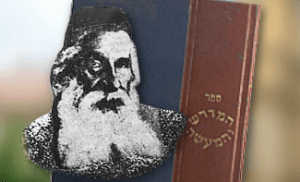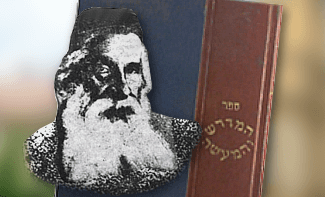
When Moshe saw his humility, he called Hoshea bin Nun “Yehoshua.”[2]
What sort of humility did Moshe recognize in Yehoshua? We might be tempted to say that it was his dedication to his rebbi – the fact that Yehoshua “did not move from the tent” of his teacher. But Chazal seem to think otherwise. “A lowly spirit will support honor.”[3] They apply this pasuk to, among others, Yehoshua and Shaul. Granted that the latter showed much humility as the one who “hid among the vessels” in order to spurn an appointment to national leadership, but what specifically did Shaul and Yehoshua share that they are grouped together, skipping over all figures who lived between them?
Chazal tell us[4] that the Bnei Yisrael were lax in eulogizing Yehoshua after his death. Why would they fail to do justice to the popular disciple of the popular Moshe? We can explain by way of a common occurrence. A person arrives from a distant location, eager to interact with a famous personality in the new town. He is underwhelmed when he meets him; he fails to find evidence of outstanding intellect. He speaks critically of this town chacham, but is rebuffed by the more perceptive townspeople. His greatness, they tell him, is not in what he says, but in what he does not say. You will not catch him in any falsehood or inaccuracy or even unnecessary speech. That, indeed, takes chochmah.
In leading a community, we find people who are renowned for their creativity and accomplishment. When a generation acts properly, these are the kind of leaders the community deserves. We are aware of others who are underwhelming, and never are given the laurel of public accolades. To the contrary, they are met with criticism and derision. They devote themselves to preventing erosion of values, to stop the backsliding of a generation that acts improperly. They don’t see themselves as innovators, so much as preservers. When people expect the first kind of leadership in a generation that more desperately needs the second, they wrongly criticize their leaders.
Talented human beings love creative change. It therefore takes a special personality to preserve and perpetuate, rather than innovate. Most importantly, it requires humility. Shaul possessed humility in spades. He did not want to become king, and hid himself to avoid being chosen. He understood that his reign was only meant to prepare the way for a monarchial succession through the tribe of Yehuda. His goal was modest. He wanted to take the nation entrusted to his care, together with all their material and spiritual possessions, and pass them on to his successor. He did not try to build an empire or introduce major changes in what he was given.
Reining himself in, resisting the urge to change and improve, takes strength. This is reflected in a passage in the gemara.[5] “Whoever designates for himself a set place for his prayer, the G-d of Avraham will assist him. When he dies, they will say about him, Woe for the loss of this humble person, of this chasid. He is among the students of Avraham, our forefather.” Prayer/ tefilah, means more than the words that a person utters. It implies his inner wants, desires, and longings. Most people cannot limit their desires, be they in their personal or their communal life. Their “prayer,” then, has no limits and boundaries. It has no place. The rare person who can suppress, where necessary, the need to change and innovate, thus “sets a place,” a circumscribed focus for his “prayer” and his energies. He follows the lead of Avraham, who when told of a great blessing to be bestowed upon him, blurted out that it would suffice if Yishmael would thrive and carry on his work.
When such a person dies, he is mourned for the loss of his humility (without which he could not have limited his agenda) and his chassidus. Even though the preservers, as mentioned above, are roundly criticized during their lifetimes for being dull and unimaginative, this ceases with their death. People look back at their accomplishment and suddenly understand the importance of preservation, even without the drama of innovation.
But not always. Sometimes, he has left his community so strong, that he is not immediately missed. People do not realize how that strength was his doing until they see signs of erosion. This is what happened to Yehoshua. Yehoshua was a preserver, not an innovator. (When many halachos that Moshe taught were lost upon his death,[6] it took Osniel ben Kenaz to restore them with his sharp mind. This does not imply that Yehoshua’s thinking was any less acute. Yehoshua, however, was so perfectly devoted to faithfully transmitting teaching of his rebbi, that he recoiled at the thought of interposing his own understanding.) The preservers are criticized by the “street.” And so it was with Yehoshua. The criticism took its toll on his public image, enough that the eulogizing of him was lukewarm.
The gemara continues that those who are lax in eulogizing the departed chacham do not live long. “Yisrael served Hashem all the days of Yehoshua, and of the elders who extended their days after Yehoshua.”[7] Their days were extended, says the gemara, but not their years. A person who denies that the dead will be resurrected is not allowed to return at the time of the resurrection.[8] Part of the take-away from this is that a person who unfairly rejects some important concept is not given the same opportunity of others to live to see the truth of that concept. Similarly, the zekenim who belittled Yehoshua because they failed to appreciate the role of the protector and preserver of society were not permitted to live to see the error of their thinking. Yehoshua’s success continued beyond his death. But it could not continue forever. In his absence, little by little the spiritual level of the people declined. In time, people could look back and appreciate the greatness of Yehoshua’s mission. It did not take all that long. Therefore, the zekenim extended their days – but not their years.
Chazal saw commonality between Yehoshua and Shaul that we would have missed. Both were hugely affected by their humility. In the case of Yehoshua, Moshe realized that this humility would leave him vulnerable to the false piety of the masses who argued that sending spies was a mitzvah, because it would minimize the miracle that Hashem would have to work to conquer the Land. (In reality, the fact that they came, as Chazal describe, in a mixed mob, without regard for age and rank, betrayed their inner feelings. They were moved not by a desire for less of a miracle, but because they had too little emunah!) Moshe added a letter to Yehoshua’s name to bolster his chances.
The humility of both Yehoshua and Shaul, then, did not just contribute to some sterling midos. It shaped the contribution that they were both able to make, one that continues with Jewish leaders throughout history, even if they are the unsung heroes.


